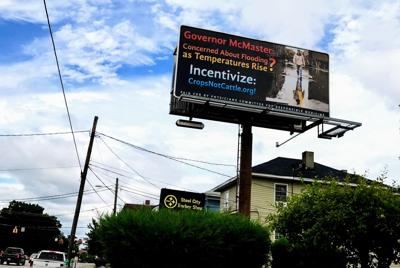A few blocks from the governor’s mansion in Columbia, billboards went up earlier this month urging Gov. Henry McMaster to combat flooding by paying cattle farmers to switch to planting fruits, vegetables and grains.
It’s part of a campaign by the Physicians Committee for Responsible Medicine to reduce the atmospheric levels of methane gas, which cows produce in great quantities and which the U.S. Environmental Protection Agency says is the second most abundant greenhouse gas after carbon dioxide.
The Washington-based group, which promotes plant-based diets, argues that we should concentrate more on methane because it’s 25 times as potent at trapping heat in the atmosphere as carbon dioxide and dissipates more quickly, which means reducing production could pay off faster. Columbia’s State newspaper reports that the group decided to launch its cropsnotcattle.org initiative in South Carolina because flooding is such a huge problem here.
There’s no question that Americans eat more meat (and everything else, for that matter) than is healthy. And contrary to the impression you’d get from the hostile reaction from farm organizations, there’s nothing anti-farmer or even anti-cattle about suggesting the state provide incentives for any farmer who might want to switch to a more carbon-friendly operation.
Still, it’s a bizarre effort, since South Carolina doesn’t come close to being a major cattle producer and the only thing a governor could do about incentives is to ask the Legislature politely to create them. And we suspect that we speak for most South Carolinians when we say we have no interest in eliminating meat as a food source.
But the campaign is an important reminder that we need to be thinking — and acting — more broadly about how we can combat the flooding that poses an existential threat to Charleston and, by extension, a massive economic threat to our entire state.
South Carolina officially got serious about flood mitigation last year, when the Legislature created a state resilience office, staffed it with flooding experts, began to develop a statewide resilience and risk reduction plan, and required cities and counties to include resiliency planning in their comprehensive plans. We have a lot to do just to fulfill the vision behind that new office, but it's not enough.
Beyond buying out properties that repeatedly flood, discouraging or even prohibiting building in more flood-prone areas, improving drainage systems, building a wall around peninsular Charleston and taking other steps to mitigate the effects of higher sea levels and heavier rainfall events, we also need to focus on the higher global temperatures that are driving these catastrophic changes.
Our planet does a lot on its own, and human-influenced greenhouse emissions — from cars or cattle farms — clearly aren’t the only cause of global climate change. But they just as clearly are a part of the problem — and a part that we have the power to change.
While the most significant progress will come from national efforts and international treaties, our state and our communities can’t use that as an excuse to sit on the sidelines. The possibilities are limited only by policymakers’ imagination — and their willingness to act.
For instance, we always need to makes sure that the incentives in our tax system incentivize the activities we want more of in our state and discourage those we want less of. Whether we take on cattle or not, we should encourage private investments that reduce heat-trapping gases.
State and local governments need to reduce their carbon footprints through such efforts as upgrading buildings to make them more energy-efficient, installing solar panels and battery-storage technology in government offices and transitioning vehicles away from gas and diesel engines. Lawmakers might encourage this by tweaking the state's procurement code to give preferences to energy-efficient purchases. (And since flood-mitigation is one of the acceptable uses for the boatloads of COVID recovery money the federal government is shipping into South Carolina, officials at all levels should be thinking about how they could invest some of it in anti-greenhouse efforts.)
Local or even state government might encourage individual efforts by installing charging stations for electric vehicles, expanding opportunities for people to compost more food waste and building more pedestrian pathways to increase the number of people who walk or bike to work and shopping.
The anti-cattle group apparently wants Mr. McMaster’s S.C. Floodwater Commission to take on that broader challenge. But the commission made a deliberate decision to deal exclusively with the effects of flooding rather than its causes, and while it did come up with the idea of having a state resiliency office, it further made the decision to play up small, individual efforts, from cleaning out overgrown creeks to planting trees.
And frankly, our state faces such a dire threat that there clearly is a role for an organization focused solely on flood mitigation and encouraging individuals to make a difference — not just because it increases the political buy-in for any larger efforts but also because individuals can make a difference.
What we need is an entity — not necessarily a new state agency, or even an agency at all — that can take the lead on envisioning, encouraging and coordinating the many efforts our state needs to undertake to help address global climate change. But first, we need a lot more state and local leaders who are committed to that goal.














